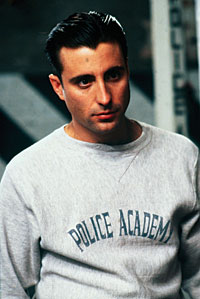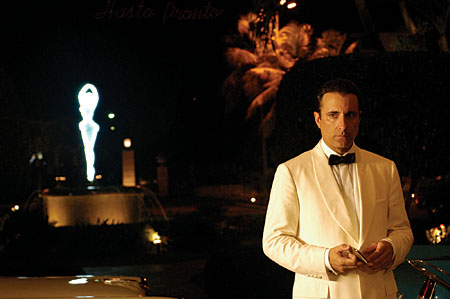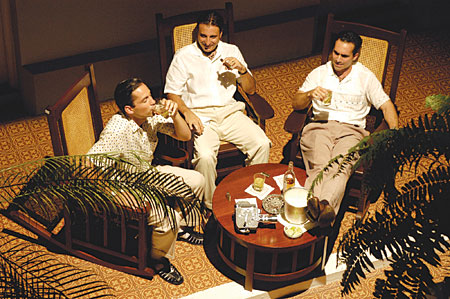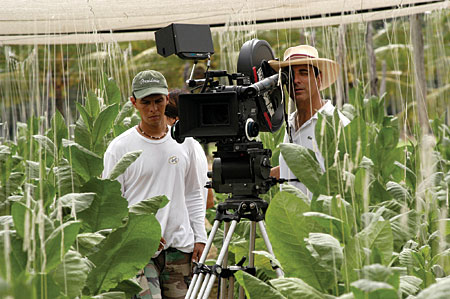HT Talks To . . . Andy Garcia
Whether he plays the hero or the heavy, the always-intense Andy Garcia is impossible to ignore on screen. With The Lost City (on DVD August 8 from Magnolia Home Entertainment), G. Cabrera Infante's bittersweet tale of the Cuban Revolution, the Havana-born actor/director has crafted a profound cinematic work and one of his most powerful performances. Just don't call him a sex symbol.
 I understand You got your start in TV. Hill Street Blues, right?
I understand You got your start in TV. Hill Street Blues, right?
Hill Street Blues was one of the early things I did, yeah. But, really, I came in the door through film. I did a film called The Mean Season. That was a movie that started bringing some attention and some greater ability to audition for other parts. It was the next one, 8 Million Ways to Die, that really gave me a kick start, even though the movie wasn't "commercial." But, from the industry point of view, a lot of people saw the film, and that's what got me The Untouchables.
Weren't You originally offered the Frank Nitti role in The Untouchables?
Yes, they talked to me about the Frank Nitti part.
But he doesn't talk much.
No, he just shoots. [laughs]

And falls off the roof.
Exactly.
Do you prefer playing the good guy over the bad guy?
No, not really. I don't have a preference about that. I enjoy whichever side stimulates me. It's not a popularity contest.
So, is The Untouchables the best mob movie ever made?
Oh, I don't know. That's not for me to say. I'm proud of the film, but I don't know if it's the best one ever made. That's a pretty big statement.
When I was in Chicago, I had to find that staircase.
[laughs] Well, the fact that you think of it in those terms is certainly a tremendous compliment.
After doing The Untouchables and The Godfather: Part III within three years, did you worry at all about being typecast as a gangster-movie actor?
Uh. . .no.
Did you ever worry about being typecast as an Italian?
[pause] No.
I hear you're uncomfortable being called a sex symbol.

I mean, I'm not uncomfortable with it. I just don't buy into it. I don't consider myself in those terms. I don't say [mock indignation], "Oh, don't call me that!" Whatever, if that makes you happy. I could be called worse things. That's a good problem to have, I guess. But you can't take those things seriously.
There was some criticism of The Godfather: Part III when it was released, but it's part of one of the great film sagas. Have the years put it into any new perspective for you, or do you not think about movies past?
I'm very proud of that movie, of my association with that trilogy. It's very difficult to compete with two of the greatest movies ever made. I've learned over the years that the audience has embraced the movie as part of that trilogy. And that's a huge accomplishment when you're trying to follow in the footsteps of The Godfather and The Godfather: Part II. I have only the greatest of memories and the greatest of thoughts about that.
How do you feel about recording commentaries for your movies on DVD?
I know when the Criterion Collection and stuff like that started to put those kinds of things together, I appreciated it tremendously, as a film buff and as an aspiring director. So, I think it can be very interesting. I'm concerned, though, about too much behind-the-scenes prior to the movie coming out.
What struck me most about The Lost City is that I think we are in a time of complacency in this country right now, and everyone in the movie is so passionate.
Well, you know, the Cuban culture is a very passionate culture. A woman saw the movie the other day and told me something similar: "I was so moved by how tactile the movie was." She recognized how much people hugged and kissed and touched each other and how much contact there was between not only the women but the men in the movie. This is who we are.
I have to say, too, that your movie also educated me about what happened after the revolution, both in Cuba and with the American experience for the refugees.
Thank you. You can't expect people to know all of the specifics of Cuban history, so, in that sense, it is educational for people. I've been getting that a lot.
Has The Lost City been your biggest challenge as a director so far?
Yes.
Have any of the directors you've worked with inspired you?
All of them. I mean, I've gone to school on the ones I've worked with and the ones I haven't worked with. That's where my film school has been. I never went formally to film school, but I went to it on the set. I've been fortunate to be blessed with that kind of relationship with some of the great directors.

You also wrote the music for the film?
I've been collecting Cuban music and music in general all my life. In 1990, I made my first movie, a documentary on the life of Cachao, the legendary Cuban bass player who created the mambo. And, for the past 10 years, I've been recording him, and I was recording some of the stuff specifically for this movie. We've had four records together, and we've won three Grammys together. So, it's something I'm very much involved with. When I got this script in 1990 from Mr. Infante, it said that my character played the piano. And I was always attracted to the piano, but I never had played, so I rented a piano. I started to play around with it just so I could be ready to fake it when the time came for the movie, but it took so long for the movie to get made that I eventually learned how to play. [laughs]
[incredulous] Self-taught?
Yeah, I'm self-taught. So, I had a piano in the editing room, and I wrote the score for the film.
The scenery is also very beautiful: Why did you choose to shoot in the Dominican Republic?
Well, it's very similar to Cuba geographically, obviously—it's the next island over. And it has a very impressive palace, a Caribbean palace, which is sort of a copy of the American Capitol, but in peach. I got a chance to meet the president, and I asked him for his support. I said, "Well, I want to re-create this historical event that happened in Cuba," which was the attack on the palace by the Directorio Revolucionario. And he said, "That's fine. You can attack the palace, but it's got to be on a weekend." So, we hung the Cuban flag and attacked the palace.
You were able to get all those shots on Saturdays and Sundays only?
No, just on a Saturday/Sunday—no plural. [It was a] long weekend.
You were born in Havana, correct?
I was born in 1956; I came over in '61.
Do you remember much about it?
Oh, yes, I remember a lot. And they're very protected memories.
Do you think Americans will ever be allowed back?
I hope and pray that there will be a rapprochement with not only the exile community but also with America. And democracy—as a Cuban, I'm still waiting for the promise of the revolution, which was the constitution and a democracy.
The Lost City is your third movie with Dustin Hoffman?
It's my second one. Oh, sorry, you're right—it's the third. But, in confidence, we were in the movie together, but we didn't work together.
Are You guys pals?
Yes, very much.
Before I go, can you offer any hint of what to expect in Ocean's Thirteen?
Well, Al Pacino's going to play the antagonist, and I'm going to be in it also, so I could be an antagonist with him. Or I could be an accomplice. You never know. That I can't reveal.
























































